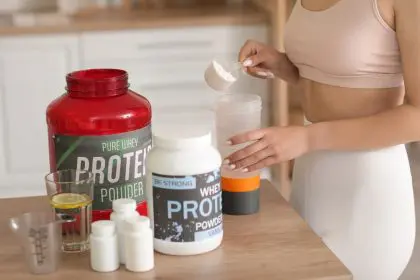I fell in love with fitness in the ’90s around the time when step aerobics and strength training for women became wildly popular.
As a teen, I began reading magazines like Muscle & Fitness and distinctly remember seeing ads for Met-Rx and eventually thermogenics like Ripped Fuel and Hydroxycut. In fact, since the mid ’90s, I have used many of the various popular thermogenics that have bombarded the market.
I was not alone in how readily I consumed products that contained ephedra before it was pulled from the shelves and banned in 2003. According to Sports Illustrated, in 1999 alone, some 12 million Americans consumed products containing the now banned substance. Since then, there have been dozens of cases of deaths linked with OTC (over the counter) supplements containing ephedra and DMAA. Upon discovering that the vitamin and supplement market in our country is not regulated by the FDA, I was frightened. After having taken many OTC diet and weight-loss supplements over the years, I wonder how much I’ve put my health at risk
Here are three things you should know before you use any diet or fitness-related supplements:
- Surprisingly, the supplier is held accountable, not the retailer. If something goes wrong with a supplement containing dangerous ingredients (such as ephedra or DMAA), the store it was sold in isn’t liable. As such, even a reputable chain could be selling something that is unsafe.
- Our government plays a relatively small role in ensuring that OTC supplements are safe for human consumption. More than half of U.S. adults — or at least 114 million people — take dietary supplements, and the majority mistakenly believe that a government agency approves such products. Unlike pharmaceutical companies, supplement makers are not required to prove that their products are safe and effective on humans. Nor do they have to get federal approval before selling their products. The FDA is not spending the time or money it would take to ensure that the approximately 85,000 supplements available to consumers are safe. This would require first discovering and revealing the potentially hazardous drugs, and then proving them as such.
- Individuals who use OTC supplements are at risk. Instead of the retailers and manufacturers suffering any financial consequences of selling products that are known to be unsafe, individual people are paying a price. In professional sports in particular, athletes are being fined or suspended from games from ingesting products that are being marketed as safe. Because there is not regulatory control on what is put into these supplements, I don’t think that the individual consumer should be held solely responsible for what is essentially a booming industry that big corporations are profiting from. I think that the accountability should lie with the large corporations. I agree wholeheartedly with NY state Sen.Jeffrey D. Klein, who wants the sale of DMAA banned in his state. He asserts “You are in the business of selling ‘healthy’ products to consumers. I think you have a duty, before you put it on your shelves, to ensure that it’s not dangerous.”
Perhaps if more people were educated on the lack of regulation in the supplement industry, they would make better and safer choices when choosing what to take.
Wishing you health and happiness,
HLJ
Holly Lowe Jones is a media professional, fitness expert, and ISSA-certified personal trainer. A member of the National Association for Health and Fitness, Jones is also a seasoned triathlete who competes in her spare time.
For more information, please visit her website www.hollylowejones.com.
Facebook: www.facebook.com/hollylowejones
Instagram and Twitter: HollyLoweJones
















